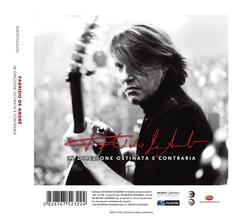Canzoni - Fabrizio De André
$ 3.99 – $ 5.99
Like 1968's V.
3, 1974's Canzoni collects on LP several songs De André had previously recorded as singles for the Karim label, albeit present here in new and improved, definitive versions.
Actually, Canzoni is a sort of covers record in disguise, since it includes three Georges Brassens' numbers, two Leonard Cohen's, one Bob Dylan's, and a traditional French song from the 15th century.
Only the remaining four songs are De André originals but these had been first released almost a decade ago, so one could make a case of De André covering himself.
There are two reasons why De André decided to release this material then.
First, in order to finally shut the door on the first part of his career by committing to record all the remaining loose ends and leftovers from the Karim period.
Secondly, because severe depression and alcoholism had run him into a creative impasse, and he figured that since he was not able to write he should at least keep busy doing translations.
In fact, the only three previously unreleased songs, "Via Della Povertà," "Morire per Delle Idee," and "Le Passanti" were all covers.
All this should not mislead the reader into expecting a hastily or indifferently put together throwaway.
Sure, given the diversity of its sources, Canzoni is not as internally coherent as De André's superb concept albums of the early '70s.
Individually, however, each one of its songs is just about brilliant.
Highlights include "La Canzone Dell'amore Perduto," set to a simply majestic air from a Georg Philipp Telemann concert, and "Le Passanti," a Brassens' tune based on a poem by Antoine Paul that may very well capture the definitive portrait of melancholia in song.
The success of this album lies in the fact that, while the musical arrangements pretty much respect the originals, De André rewrites the material into Italian, rather than just translating it.
His versions are so perfectly tailored to his style that anyone familiar with De André, but unfamiliar with the artists he is covering, would immediately assume these are his own compositions -- as in fact many Italians still do, since Brassens, Cohen, and even Dylan are not exactly household names in Italy (and those in the know probably became acquainted with them thanks to De André, anyway).
Canzoni is also significant as it signals De André's final tribute to Brassens, an influence that loomed so large for the entire first part of De André's career that at one point it threatened to suffocate his own voice.
Instead, Dylan and Cohen will become -- at least temporarily -- the new points of reference, something that will also become apparent in the music, leaving its European folk songs roots and moving closer to the American singer/songwriter mold.
Another sign of things to come is a stunning rendition of Dylan's "Desolation Row," the entire ten minutes of it, but in sparkling Italian.
Co-written with Francesco De Gregori, this track marks the first collaboration between Italy's two finest songwriters, one that would flourish in De André's next album, the simply awesome V.8.
| Title/Composers | Performer | Listen | Time | Size | Size | |
|---|---|---|---|---|---|---|
| 1 | Via Della Poverta' | Fabrizio De André | Play | 09:36 | 21 MB | 57 MB |
| 2 | Suzanne | Fabrizio De André | Play | 03:28 | 7 MB | 17 MB |
| 3 | Morire Per Delle Idee | Fabrizio De André | Play | 04:25 | 10 MB | 23 MB |
| 4 | La Citta' Vecchia | Fabrizio De André | Play | 03:23 | 7 MB | 19 MB |
| 5 | Giovanna d'Arco | Fabrizio De André | Play | 04:50 | 11 MB | 24 MB |
| 6 | Delitto di Paese | Fabrizio De André | Play | 03:55 | 8 MB | 20 MB |
| 7 | Valzer Per un Amore | Fabrizio De André | Play | 03:40 | 8 MB | 20 MB |
| 8 | Le passanti | Fabrizio De André | Play | 03:51 | 8 MB | 18 MB |
| 9 | Fila la lana | Fabrizio De André | Play | 02:40 | 6 MB | 13 MB |
| 10 | La ballata dell'amore cieco | Fabrizio De André | Play | 03:02 | 6 MB | 18 MB |
| 11 | La canzone dell'amore perduto | Fabrizio De André | Play | 03:21 | 7 MB | 18 MB |
| 46 mins | 105 MB | |||||
| 46 mins | 252 MB | |||||
| Artist | Job | |
|---|---|---|
| 1 | Fabio Berruti | Graphic Design, Photo Restoration |
| 2 | Roberto Dane | Producer |
| 3 | Fabrizio De André | Guitar, Primary Artist, Vocals |
Fabrizio De André
| Quality | Format | Encoding | Description |
|---|---|---|---|
| Standard | MP3 | 320kps 44.1kHz | MP3 is an audio coding format which uses a form of lossy data compression. The highest bitrate of this format is 320kbps (kbit/s). MP3 Digital audio takes less amount of space (up to 90% reduction in size) and the quality is not as good as the original one. |
| CD Quality | FLAC | 16bit 44.1kHz | FLAC is an audio coding format which uses lossless compression. Digital audio in FLAC format has a smaller size and retains the same quality of the original Compact Disc (CD). |







